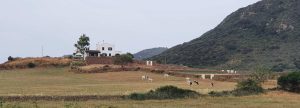No algae, but all-rounders for the beach, water, creatures and climate
On the beach or in the surf you sometimes come across seaweed. Some are disgusted by it. Neptune grass is not dirt, but an important sea plant. There are large seagrass meadows under water off the coast of Menorca. Due to their rarity and ecological importance, UNESCO has declared them to be part of the natural heritage of mankind.
The seagrass meadows form a natural protective wall in front of the coasts and ensure that the beaches are not eroded. Without seaweed, our beaches are in danger! The occurrence of Neptune grass is a sign of high water quality and an intact coastal area. The underwater meadows are the basis of important marine ecosystems. Many marine animals can be found here, including sea urchins, starfish and sea anemones. In addition, numerous fish use the meadows to raise their brood in the shelter of the stalks.
The Neptune grass meadows are particularly important for our climate. They are the ecological lungs of the sea. Did you know that one hectare of seaweed can convert 5 times as much CO2 into oxygen as the rainforest?
Unfortunately, the seagrass is severely endangered due to climate change and pollution. Above all, boats anchored over the seagrass meadows and ships sailing over them are devastating for the existence of the plant.
To preserve the beauty of our beaches and ecosystem, you too can take action by following a few rules of conduct:
- Do not anchor on neptune grass
- Don't throw rubbish into the sea. Don't leave litter on the beach. Dispose of your rubbish in the containers provided for this purpose at the parking lots
- Do not discharge dirty water into the sea
- Do not collect living creatures or plants
- Stay on designated paths with vehicles
- Only camp in campsites
- Don't make a fire in the wild
- Dogs and other pets are not allowed on the beach
We can only preserve its beauty if everyone helps to maintain this important ecosystem. Many Thanks.






